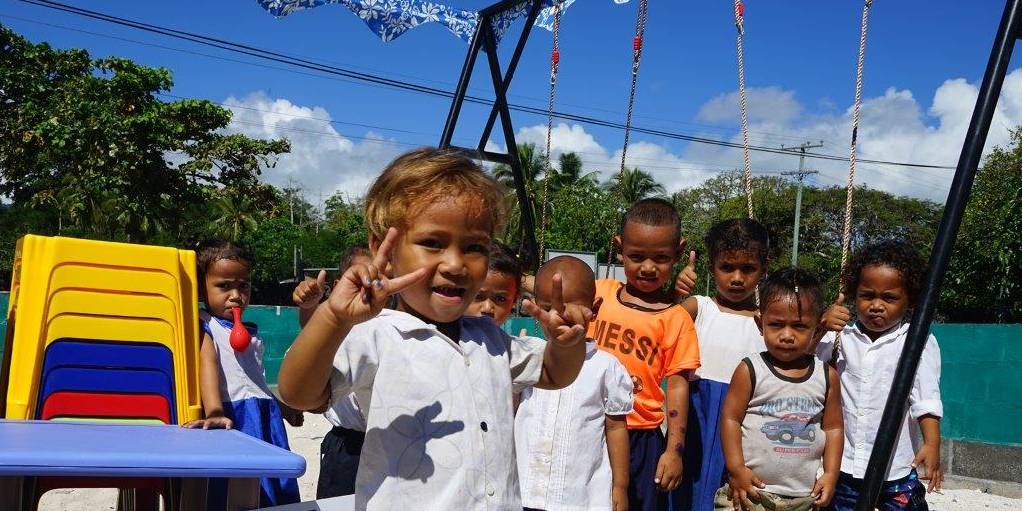
Building a more resilient education system in Samoa
Research 1 Jul 2021 6 minute readA new Australian partnership will help Samoa review remote learning strategies implemented as a result of COVID-19 school closures.
COVID-19 related school closures and a measles outbreak in late 2019 have significantly disrupted education in Samoa. In response, the Ministry of Education, Sports and Culture (MESC) introduced distance and remote learning approaches, including TV, radio and online channels.
As with many education systems worldwide, engagement in remote learning in Samoa has varied. Limited access to the internet and online learning platforms in the homes of vulnerable students, poor internet connection in schools, and limited staff to monitor remote education and address technical issues are just some of the challenges. In many cases, teachers and students also lack the skills to access and navigate online learning programs.
To build resilient education systems and address challenges in learning continuity caused by COVID-19, the Australian Strategic Partnerships in Remote Education (ASPIRE) initiative matches Australian experience and expertise in remote education with partners in the Indo-Pacific region. Through ASPIRE, a new partnership between the Queensland Government’s North Coast Region (NCR) and MESC has been established. MESC has engaged NCR to review the efficacy of its remote learning approaches during COVID-19 school closures, with the aim of informing future strategies to provide educational continuity during periods of disruption.
The new partnership builds on Australia’s longstanding history supporting education in Samoa, including the Education Sector Support Program Phase 2 (2019-2024), which focuses on strengthening quality and inclusiveness of basic, technical and vocational education. In the context of COVID-19, the program has also supported the sector’s pivot to prepare for learning continuity and resilience of the education system, in light of future disruptions.
With the use of information technology for teaching and learning a significant focus of MESC’s Education Sector Plan (2019-2024), understanding the impacts of its current approaches will play a vital role in building a more resilient education system. NCR brings its own learnings and experiences of navigating remote learning during school closures in Queensland during COVID-19 to the partnership. While there are differences in context, students faced similar challenges in accessing and connecting to online learning platforms. In part, this can be attributed to the diverse social and geographical contexts of North Queensland’s student population, where those living in remote rural areas were more likely to be affected by limited health and social services.
The review will focus on the availability and suitability of current infrastructure to support remote education, as well the dissemination of information through specific modes of delivery. After conducting a series of interviews and discussion forums with key stakeholders, NCR will produce a report responding to the following key areas:
- Remote education approaches meet the access and learning needs of children, ensuring continuity during school disruptions
- Infrastructure and related services effectively support continuity of learning during periods of disruption
- Student learning is effectively monitored and assessed, enabling continuous improvement to remote education approaches
- Remote education approaches enable student engagement and respond to their wellbeing needs.
While school closures have a profound impact on all students, those most vulnerable are more likely to face additional barriers. Vulnerable students risk falling further behind and becoming isolated, removing the connection to school and support critical to their success. As such, this partnership will address issues of social equity and identify how improvements to remote learning infrastructure and approaches can support vulnerable students to remain connected, supported and engaged in learning.
With a commitment to quality education and a shared understanding of implementing systemic policy change, the partnership between MESC and NCR has the potential to make a profound impact on the learning outcomes of Samoan children. By understanding and improving current remote learning approaches, Samoa will also be better positioned to respond to future educational disruptions.
ASPIRE is managed by the Australian Council for Educational Research on behalf of the Australian Government’s Department of Foreign Affairs and Trade (DFAT). It supports remote education projects that aim to improve educational continuity, access and equity, in particular for disadvantaged students. ASPIRE supports and contributes to DFAT’s Partnerships for Recovery: Australia’s COVID-19 Development Response.